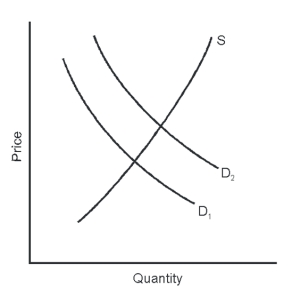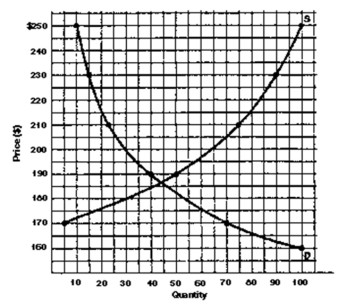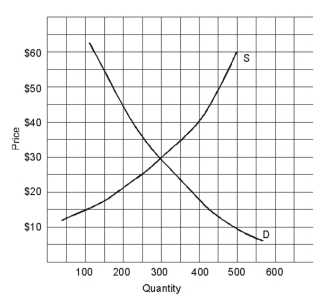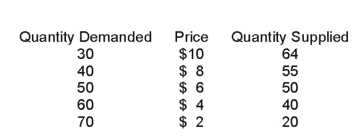A) quantity demanded of a good does not vary with price.
B) quantity demanded of a good varies directly with price.
C) quantity demanded of a good is negatively related to its price.
D) quantity demanded depends on the quantity supplieD.
Correct Answer

verified
Correct Answer
verified
Multiple Choice
A decrease in demand means that quantity demanded falls
A) at least one price.
B) at a few prices.
C) at most prices.
D) at all prices.
Correct Answer

verified
Correct Answer
verified
Multiple Choice
If a price ceiling is set above the equilibrium price,then
A) prices will fall as soon as the ceiling price is abolished.
B) prices will remain the same (not rise) when the price ceiling is lifted.
C) equilibrium price and ceiling prices are two totally different concepts and hence do not affect each other.
D) prices will begin to rise rapidly when the price ceiling is lifteD.
Correct Answer

verified
Correct Answer
verified
Multiple Choice
When quantity demanded is greater than quantity supplied
A) price will fall to its equilibrium price.
B) price will rise to its equilibrium price.
C) price may rise,fall,or stay the same,depending on a variety of factors.
Correct Answer

verified
Correct Answer
verified
Multiple Choice
If the equilibrium price of corn is $3 a bushel and the government imposes a floor of $4 a bushel,the price of corn will _______________________.
A) increase to $4
B) remain at $3
C) rise to about $3.50
D) be impossible to determine
Correct Answer

verified
Correct Answer
verified
Multiple Choice
The forces of demand and supply ensure that at equilibrium
A) there are no shortages or surpluses.
B) there are no shortages,but there may be surpluses.
C) there are no surpluses,but there may be shortages.
D) there may be shortages or surpluses.
Correct Answer

verified
Correct Answer
verified
Multiple Choice
 -A shift from D1 to D2 causes equilibrium price to __________ and quantity to __________.
-A shift from D1 to D2 causes equilibrium price to __________ and quantity to __________.
A) rise;rise
B) fall;fall
C) rise;fall
D) fall;rise
Correct Answer

verified
Correct Answer
verified
Short Answer
 -Equilibrium price is _____.
-Equilibrium price is _____.
Correct Answer

verified
Correct Answer
verified
Short Answer
The basic reason for the gas lines in 1973 and 1979 was _____.
Correct Answer

verified
Correct Answer
verified
Multiple Choice
 -In the graph shown above,if market price were $23 there would be
-In the graph shown above,if market price were $23 there would be
A) a surplus.
B) a shortage.
C) a surplus and a shortage.
D) neither a surplus nor a shortage.
Correct Answer

verified
Correct Answer
verified
Multiple Choice
If the demand for mushrooms increases while the supply remains unchanged,this will result in
A) a shortage of mushrooms as the market price remains unchanged.
B) an increase in the quantity of mushrooms sold and an increase in their price.
C) an increase in the quantity of mushrooms sold but no change in price.
D) a decrease in the quantity of mushrooms sold and an increase in their price.
Correct Answer

verified
Correct Answer
verified
Short Answer
Price always tends toward its ______________ level.
Correct Answer

verified
Correct Answer
verified
Multiple Choice
 -In the graph shown above,equilibrium price is _______.
-In the graph shown above,equilibrium price is _______.
A) $25
B) $30
C) $35
D) $40
Correct Answer

verified
Correct Answer
verified
Multiple Choice
At equilibrium,each of these is true except
A) quantity demanded equals quantity supplied.
B) the price has no tendency to change.
C) market price equals equilibrium price.
D) there may be a shortage or a surplus.
Correct Answer

verified
Correct Answer
verified
Multiple Choice
When market price is below equilibrium price
A) a shortage is generated.
B) a surplus is generated.
C) quantity demanded is greater than quantity supplied.
D) then both a shortage is generated and quantity demanded is greater than quantity supplied,but a surplus is not generateD.
E) then both a surplus is generated and quantity demanded is greater than quantity supplied,but a shortage is not generated.
Correct Answer

verified
Correct Answer
verified
Short Answer
A change in consumer taste will prompt a change in _____.
Correct Answer

verified
Correct Answer
verified
Multiple Choice
 -When the price is $2
-When the price is $2
A) quantity supplied is greater than quantity demanded and,therefore,price must rise to get to equilibrium.
B) quantity supplied is less than quantity demanded and,therefore,price must fall to get to equilibrium.
C) quantity demanded is greater than quantity supplied and,therefore,price must rise to get to equilibrium.
D) quantity demanded is greater than quantity supplied and,therefore,price must fall to get to equilibrium.
Correct Answer

verified
Correct Answer
verified
Multiple Choice
If government legislates a price floor that is below the equilibrium price
A) a shortage will develop.
B) a black market will soon develop.
C) a surplus will develop.
D) market price and quantity sold will be unaffecteD.
Correct Answer

verified
Correct Answer
verified
Multiple Choice
When the market price of a good is below its equilibrium price,competition among
A) buyers will push the price up.
B) buyers will push the price down.
C) sellers will push the price up.
D) sellers will push the price down.
Correct Answer

verified
Correct Answer
verified
Multiple Choice
 -In the graph shown above,if the government set a price ceiling of $18
-In the graph shown above,if the government set a price ceiling of $18
A) the price would rise to the equilibrium price.
B) the price would fall to equilibrium price.
C) there would be a temporary shortage,then price would rise to equilibrium price.
D) there would be a permanent shortage,at least until the price ceiling was lifteD.
Correct Answer

verified
Correct Answer
verified
Showing 161 - 180 of 255
Related Exams